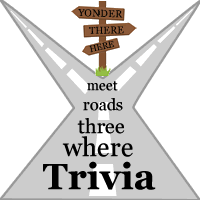
I learned the other day that the word trivia (insignificant trifles of little importance), comes from the Latin trivia, the plural of trivium – crossroads, public space, or literally “a place where three roads meet”. From trēs (three) and via (road, street, way, journey, march, passage, way method).
Apparently this term came to be used for anything commonplace. Also, beginners courses in universities used to be called trivium, and the word came be used to refer to things that are basic, simple or trivial [source].
The Latin word via comes from the Proto-Indo-European *weǵʰ- (to bring, to transport), which is the root of such English words as way, wagon, wain (as in hay wain), weigh, wag, vehicle, vector, voyage, obvious and devious [source].
School courses were trivium (grammar, logic, rhetoric) and quadrivium (arithmetic, music, geometry, astronomy). Trivium led to baccalaureate, quadrivium to magistrature, for doctorate and facultas docendi you had to pass additional examinations and win a disputation.
Thanks, old_nomad, that’s interesting. A bit of gegengoogeln (“checking by googling”, literally „counter-googling“) revealed that together the trivium and the quadrivium constituted the seven liberal arts that were Europe’s standard educational syllabus from the Ancient Roman Empire up until the (European) Renaissance. Man lernt nie aus. (“You live and learn.” in its literal, not its moral lesson, sense).